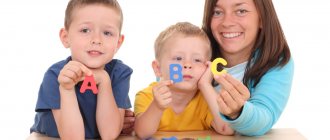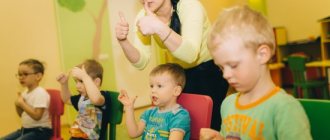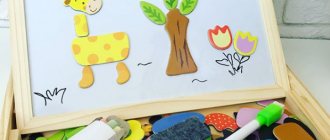I would like to discuss another burning topic - means of developing the speech of preschool children. After all, we all dream that children will immediately learn to explain themselves in sentences, with the right words and with the right endings.
And with the right approach, you can significantly speed up this process!
Basic means of speech development
The importance of speech
Agree, until the first conscious words and statements it is difficult to perceive a screaming lump as a person with his own thoughts and desires, but a talking child is already a worthy interlocutor with whom you can and should talk about literally everything.
The child himself also needs the ability to speak. It helps him communicate with family, friends, and peers in the garden.
Methodological tools
- conversation with adults;
- speech of a kindergarten teacher;
- special classes, for example, with a speech therapist or lessons on early development methods;
- reading fiction;
- art classes.
Communication with family
When the child begins to speak his first words, there is no need to relax, there is still a lot of, but interesting work ahead. We talk to him as often as possible, talking about surrounding objects and actions, calling names, colors, characteristics of things, asking leading questions, playing with him.
Recommendations for home:
- reading poetry, nursery rhymes, tongue twisters, fairy tales;
- sing simple and catchy songs with him, as musical works train breathing, help cope with stuttering, form correct phonemic hearing, and develop a speech rate;
- recite simple poems or riddles with him that involve pronouncing the right word, read the first part to the baby, and let him say the last word, remember, and choose. If the child finds it difficult, you can suggest the first part of the required word;
- watch and read colorful fairy tales with your child, pointing your finger at the mentioned characters and objects as the story progresses; dialogues need to be read in different intonations, you can even copy the voices of animals and people;
- use finger games, it has been proven that these interesting, memorable poems and songs, when combined with certain gestures, not only help develop memory, but also accelerate the development of speech, and playing them is very interesting even for adults, you know, it’s addictive!
Be sure to read about the features of using tongue twisters for children.
Kindergarten teacher's speech
A very important part of the development of coherent speech, because the child hears this person almost every day for several hours and remembers the peculiarities of the construction of words and sentences. It has been proven that children, like sponges, absorb new interesting phrases and expressions, so that they can later use them in conversation.
The most favorable environment for children is the calm, friendly tone of the teacher and his meaningful, understandable and vivid speech.
Special classes
In principle, in early childhood development classes, teachers use all the same methods as caring mothers - the same nursery rhymes, rhymes, songs, riddles, finger games.
Reading fiction
The effectiveness of fairy tales and folklore for a child is difficult to overestimate, because you and I grew up and learned from stories about the pockmarked hen, sleeping beauty, Cinderella, Little Red Riding Hood and many other instructive stories.
The methodology as a science also recognizes the importance of fiction, because through it children first learn to feel the beauty and imagery of their native language, and then they try to recreate individual words and phrases.
In our age of technological progress, modern gadgets with interesting games for kids and exciting cartoons are increasingly coming to the fore, to watch which you do not need to use your imagination and imagine the events described in history. But if possible, we still teach our children to the printed word; even the most fashionable TV cannot replace it.
Art classes
Painting, music, theater are also helpers for the development of a child’s speech; they evoke a strong emotional response, which requires dedication from the child and provokes a desire to share impressions.
Take your little one to a puppet theater or a special children's show, try to become actors yourself by playing with your favorite toys or purchasing a finger theater made from soft toys or paper figurines. Let the child express himself as a creative person, try out different roles, intonations and voices.
The means to quickly develop a child’s speech are multifaceted and varied. Sometimes it’s enough just to pay attention to the baby and have fun playing useful games to notice tangible results. Choose the most suitable game and help your baby quickly master communication skills.
Child speech development at 2-3 years old
As a rule, at 2-3 years old, even the laziest and most inert child begins to actively develop, learning new words and concepts. Pediatricians note such developmental features as active memorization of new words and their combinations. At this age, kids, like sponges, are able to learn 3-4, or even a dozen new concepts per day, developing by leaps and bounds.
Of course, the speed is different for each child. Some begin to speak in correct sentences, inflecting words literally from the age of two, while others slowly gain a passive vocabulary, memorizing new knowledge, but keeping silent until a certain time.
But at about 2-3 years, speech becomes the main tool for communication, the child tries to convey his opinions and desires to both adults and peers. And this skill needs to be stimulated and developed, helping the baby to develop more actively with the help of exercises and games.
Causes of poor speech in children
- Diseases of the ears and nasopharynx, especially with protracted diseases that deplete the body.
- Lesions of the central nervous system, characterized by mental retardation.
- Lack of attention from relatives.
Introduction
Nowadays, the development of speech in children at an early age is one of the most important and main problems, since not all children develop speech according to established standards. This problem is considered most deeply by Gribova O.E. “What to do if your child does not speak / A book for those who are interested” [3] and Tkachenko T.A. “If a preschooler speaks poorly” [13].
Purpose of the work: to study the stages of development and methods of speech formation in young children.
Object of study: preschool children.
Subject of research: stages of speech development and methods of its formation.
Research methods:
- Research theoretical material on the topic of speech development in young children.
- Formation of a methodological piggy bank for speech development.
What will help speed up speech development?
- Fine motor stimulation
It has been proven that in a child’s brain the centers responsible for clear motor skills and speech are located nearby, and stimulation of the first provokes the development of the second. Here, experts recommend using small objects that the baby can sort through; puzzles are an excellent example.
Buy simple cute pictures and collect them together with your child, captivating him with the story that in the end you can get a beautiful picture.
You can also draw with finger paints, felt-tip pens, and pencils, trying not only to train your little one’s hand, but also, during creativity, to call colors, shapes and designs by their proper names in order to increase the baby’s vocabulary.
- Breathing exercises
For correct articulation, the child needs to learn to pronounce words as he exhales, which means he needs to control his speech breathing, the strength of his voice and the muscles of his lips.
Various games are used for these purposes:
“snowflake” - cut out a snowflake from thin paper and invite the child to blow it from the palm of his hand;
“boat” - make a boat out of paper, lower it into a basin of water and invite the child to set the direction of the ship by blowing it off;
“butterfly” cut out a butterfly, and after threading a thread through it, invite the baby to make it fly - to do this, blow on it.
- Articulation gymnastics
It helps improve control of the lip and tongue muscles needed to accurately produce sounds.
The simplest exercises can be a child making antics in front of a mirror while washing his face, ask him to stretch his lips into a tube and pronounce the letter “o” and syllables with it. You can train your baby's tongue by simply smearing your lips with honey, jam or other sweets.
Later you can move on to more complex speech therapy sessions. For example, invite the child to reach his cheeks, nose, chin with his tongue, click it like a horse, and “put it to sleep” on his teeth.
An ordinary smile can be an equally useful game - it helps children master the difficult sound “Y” to pronounce.
- Outdoor games with sound
Little children love noisy, fun games, during which you need to follow the clues contained in the poems; an excellent example of such fun would be “The Sea Is Worried Once”, “Geese-Geese”.
You can learn such rhymes on your own, and then play with your baby, encouraging him to repeat at least the simplest words.
- Conversations with adults
Children cannot learn to talk, always being in splendid isolation; development is only possible with close and interesting communication. You've probably heard that you need to talk to babies literally from birth.
It is especially important to talk with children after two years. And not just limit yourself to monosyllabic answers, but explain in detail, albeit in simple words, everything that interests the baby.
In turn, you need to ask the child his opinion and decisions, stimulating not ordinary answers in the “yes” or “no” format, but real sentences - this is the only way children develop coherent speech.
To do this, you need to learn how to correctly formulate questions, abandoning the usual “do you want to eat?” in favor of “what will you eat?” or say instead of “what is the bear doing?” - “why is he crying, laughing, what is he doing?”
Conclusion on Chapter I
From the very first days of life until the end of the preschool period, children have the most important task - the formation and development of speech. Each year of a child’s life is divided into stages and at each of them speech is improved - from the first infant cry to the composition of complex sentences.
During early childhood, children undergo intensive speech development. During this time, the child’s active vocabulary exceeds the passive one; the child learns that each object has its own name; after he hears the word, he tries to repeat it; he learns to compose simple and complex common sentences.
The development of a child’s speech is closely related to communication with adults, and a lack of this communication can lead to delayed speech development and also affect the development of the baby’s psyche. A child’s communication with the people around him allows him to increase his passive and active vocabulary, improve his pronunciation and the content of his speech.
Features of speech development in children 3-4 years old
The child's vocabulary increases every month. If at the age of three he speaks 1000 words fluently, then by the age of four his vocabulary increases to 2000. At this age he already knows how to make sentences, ask and answer questions, and speaks coherently. But things don't always go so smoothly.
The development of children 3-4 years old is very individual. Some speak well and coherently, others try to answer in monosyllables or remain silent altogether. At this age, most children cannot yet retell fairy tales or stories, but they can already have a conversation about issues, especially if they are guided. In constructed sentences, they make many mistakes in case endings, the use of pronouns and gender.
Also at this age, children do not pronounce sounds clearly, some replace or throw them out, so they are difficult to understand. Experts believe that this is not yet a problem, since each child has his own characteristics, temperament, inclinations, abilities and genetics. And by the age of five he already speaks clearly and correctly.
Delayed speech development
The main reason for delayed speech development (SDD) in children is its lack of demand. This is revealed in the lack of communication with peers, lack of communication with parents and others. Typically, RRD is observed in those children who are deprived of children's company and have parents who are constantly busy with themselves.
Another reason for this deviation may be genetics or diseases of the nervous system and brain associated with mental retardation.
The next reason for the appearance of RRD is lack of hearing, complete or partial deafness. A child's speech develops based on the sounds he hears. If these sound streams do not exist, then the child will not speak on his own.
How to determine that a child has speech delay
Delayed speech development is a later acquisition of oral speech in comparison with conventional norms for children under 3 years of age. Delayed speech development can be characterized by qualitative and quantitative underdevelopment.
In order to correctly understand how to determine delayed speech development, it is necessary to know the stages and conditional norms of speech development in children at an early age.
Normally, at 1 year of age, a child’s active vocabulary contains approximately 10 words, and the passive vocabulary contains about 200 words. Up to a certain time, the passive vocabulary is much larger than the active vocabulary. Approximately 1.6 - 1.8 months. words from the passive vocabulary burst into the active vocabulary. In some children, the period of passive speech lasts up to 2 years, although in general speech development is normal.
Deviations in speech development within the normal range are allowed for 2-3 months in girls, and 4-5 months in boys. Only a speech therapist can correctly understand whether a child has a speech development delay or not.
Signs of delayed speech development at different stages of speech ontogenesis may be: lack of response to sound and speech, inactive attempts to repeat other people’s words, absence of one’s own speech at different stages of its development, absence of non-speech methods of communication.
Causes of delayed speech development
Why did the child have a delay in speech development? Causes may include disturbances during intrauterine development and the birth process, as well as adverse effects that the child encountered in the first years of his life.
The most severe disorders occur during 3-4 months of intrauterine development. At this time, the fetal nerve cells form brain structures. The causes of delayed speech development in children associated with the course of pregnancy and childbirth can be factors such as early and late toxicosis of pregnancy, extreme prematurity, birth trauma, intoxication with chemicals and drugs. Delayed speech development may be influenced by genetic factors.
Pathologies during pregnancy and childbirth are not always the causes of underdevelopment. Sometimes disorders are caused by factors affecting the health and upbringing of the child - these are reasons of a biological and social order.
Biological factor . Biological factors include complications after vaccination, a slow rate of maturation of the nervous system, as well as long-term diseases that weaken the child’s immunity at an early age. The biological basis of RRD is most often the presence of minimal brain dysfunction in the child caused by perinatal brain damage.
Hearing loss. It is very dangerous if a child has reduced hearing or cannot hear anything. When hearing loss occurs, a child’s speech cannot fully develop. In this case, even minimal deviations from the norm can be considered the cause of RRD. It is very important at what age the baby lost his hearing. If this happened at 5-6 years old, the child can retain speech skills. When a child is born deaf or has hearing loss in the first years of life, the chances of such a child speaking are zero.
Social factors. Such factors include frequent stress, lack of attention and communication in the family.
Prevention
If parents notice that their child’s speech development is lagging behind the norm, then they definitely need to contact the right specialist. Neurologists, speech therapists, defectologists, and corrective teachers are working on solving this problem. In special cases, the help of a facial surgeon or orthodontist may be needed.
In case of impaired understanding of speech, incomplete mobility of the lips, tongue, low level of fine motor skills, if hearing impairment is suspected, the following studies are carried out: hearing test, examination of speech understanding, examination of fine and gross motor skills, examination of articulation organs, examination of vocabulary, examination of phrasal speech.
Based on the results of the examination, the degree of mental retardation is determined and corrective work is planned. How is delayed speech development treated? Drug therapy, magnetic therapy, electroreflexotherapy, dolphin therapy and hippotherapy are carried out; A teacher and proofreader works with the child.
With uncomplicated forms of pathology and with fully completed correctional work, by the time the child starts school, the delay in the development of the child’s speech will be overcome. To do this, it is important that parents support all the requirements and recommendations of specialists.
Measures to prevent speech delay:
- creating conditions for a favorable course of pregnancy and childbirth, the first years of a child’s life;
- the formation of a speech environment rich in educational toys and various objects;
- ensuring normal social conditions for the life and development of the child;
- assessment of speech development by a speech therapist no later than 2-2.5 years.
In order to quickly compensate for delayed speech development, you need to promptly pay attention to the child’s communication problems. There are several degrees and varieties of RRD, which only a specialist can diagnose. He will also find out the possible cause of the development of a speech defect affecting the central nervous system and brain.
How to talk to a child
For timely development, classes need to be conducted from infancy. You need to talk to your baby slowly, measuredly, clearly pronouncing everything, don’t lisp, don’t distort words, don’t rush him with an answer and be sure to correct him if necessary.
Sometimes it is difficult for a baby to pronounce all sounds correctly, in this case he needs to be supported and encouraged, and in no case should he be scolded or teased.
During classes you should pay attention to breathing, intonation, and strive for complete answers. At the age of 3-4 years, children already know the names of toys, colors, shapes of objects, etc., so you need to communicate with him more and gently force him to pronounce all the emotions and feelings, describe the world around him, talk about his desires and needs.
If necessary, you need to contact a specialist - a speech therapist, he will advise how to approach the classes correctly, what to pay attention to first and, if necessary, he will conduct the classes himself.









